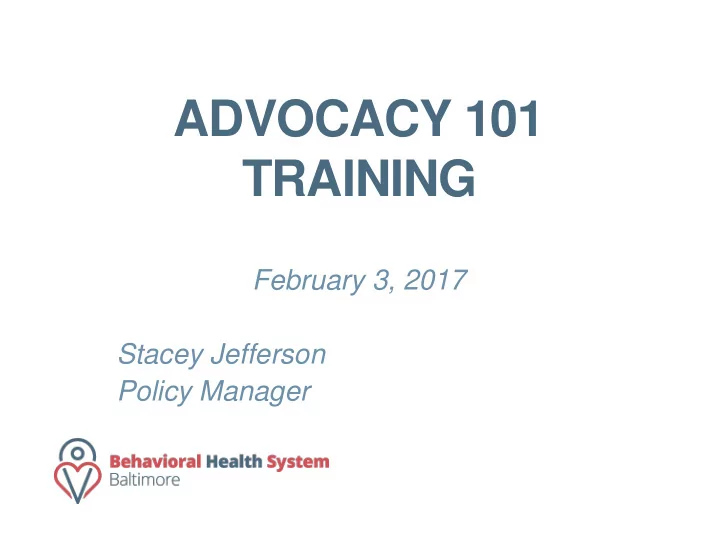

ADVOCACY 101 TRAINING February 3, 2017 Stacey Jefferson Policy Manager
ADVOCACY- WHAT IS IT ANYWAY? To advocate (verb): To speak or write in favor of; support or urge by argument; recommend publicly Advocate (noun): A person who speaks or writes in support or defense of a person or cause; to plead for or in behalf of another; to plead the cause of another in a court of law
DESCRIBING ADVOCACY Education Raising awareness Working with public officials Building relationships with local leaders Coalition building and mobilization of resources
OR, ANOTHER WAY TO THINK OF IT…. Advocacy is the educational process through which data, experiences and insight are shared with those who craft public policy so that they may make informed decisions.
TYPES OF ADVOCACY ACTIVITIES Direct communication with legislators, policymakers, and media Testify at hearings in Annapolis and before the City Council Participate in policy forums and other events Participate in media and public awareness campaigns Subscribe to policy alerts
MEDIA ADVOCACY Promotion of an organizations objectives or goals which stem from the vision and mission of the organization Based on premise that real improvements in health status come from improvements in social conditions Assumes that the root cause of health problems is a power gap not an information gap Shifts focus from giving people a message about their personal health to giving communities a voice in defining and acting on public health issues
TIPS FOR MEDIA ADVOCACY Tips for Media Interactions Goals for Media Interactions • Agenda Setting • Be available • Shaping the debate • Be open and generous • Advancing the Policy • Be trustworthy • Be accurate • Be pleasant and respectful
TESTIFYING BEFORE LAWMAKERS MD General Assembly- https://vimeo.com/173487316/443bf8b376 Baltimore City Council- https://youtu.be/gah2j3EccXQ?list=PLHAa8zfKf5XNvP6BY SQWBCOtug0_eIlIu
TELLING YOUR STORY Why is it important? Legislators, their staff, and media know little about MH and SUD treatment Treatment works and recovery is possible You are the experts They want to hear from you
TELLING YOUR STORY Tips to Remember Be Concise Remain confident Speak in terms everyone understands Never try to make more that three points Make an ask
ADVOCACY TOOLS BHSB Website and Policy Alerts www.bhsbaltimore.org National Council Behavioral Health www.TheNationalCouncil.org
OPPORTUNITIES FOR ADVOCACY Here is how you can take action : Sign up to receive BHSB’s newsletter and new policy updates Work with BHSB to invite policy makers to tour your facility Participate in the KTDO Rally in Annapolis Share your story. Provide testimony at public hearings
KTDO Rally February 23 @ Noon Lawyers Mall in Annapolis
CONTACT US Stacey Jefferson Stacey.Jefferson@BHSBaltimore.org Envisioning a city where people live and thrive in communities One North Charles Street, Suite 1300 that promote and support behavioral health. Baltimore, MD 21201 Phone: 410-637-1900 Web: www.BHSBaltimore.org Facebook: BHSBaltimor more Twitter: @BHSBaltimor more
Recommend
More recommend